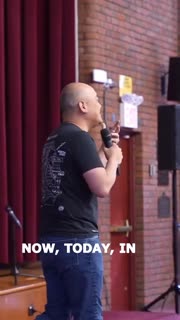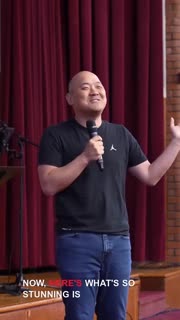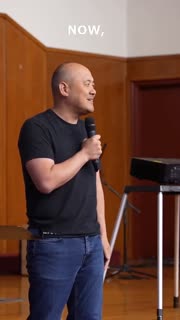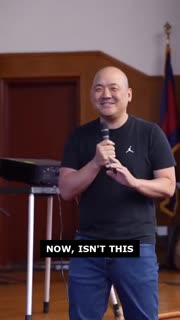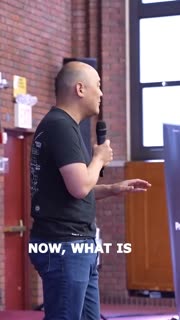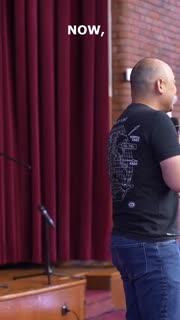Embracing Philozenia: The Call to Radical Hospitality
Devotional
Sermon Summary
Bible Study Guide
Sermon Clips
1. "Now, today, in today's world, most of us, when we think of this word hospitality, we think of, oh, it's basically a time and space for me to host people, to invite people over to my place, or to meet at a local shop or coffee shop or whatever, and to extend hospitality to the people that I love. But here, do you see, even embedded in this word is something so different. It's so extra, so unusual for even the world that we live in. It's a love that means a stranger." [02:27] (29 seconds)
2. "Now, here's what's so stunning is Dionysius actually writes a letter outlining what Christians were known for and how they behaved in the midst of bloody persecution. So you got to imagine, Christians were dying for their faith. Their families are dying for their faith. And not only that, an epidemic, a plague would come upon the Roman Empire in northern Africa, as well as regions of Rome and in the Roman Empire. And this plague, this epidemic would end up befalling so many people that people were dying and getting sick." [05:08] (30 seconds)
3. "Now, here's what Christians have observed about the early church. Because how did the early church grow? When they were just this small, easily snuffed out minority? They grew because of philoxenia, because of a love that would belie the ways, a love that extended to the sick and to the hurting and to the other. Now, that is stunning, because it wasn't like some slick marketing campaign, a beautiful website, great social media presence, like being kind of this it cool church that's serves granola bars every week. It was, there was none of that. It was the texture of philoxenia, the ways that somehow Christians embody a kind of love, a kind of ethic, that would be so different than the ways of the world." [08:09] (72 seconds)
4. "Now, isn't this stunning? That this is what the early Christian church was known for. And yet today, there's actually a word that's popular in today's culture. In fact, many would actually say that a lot of Christians exhibit this other word that you don't even have to know Greek, but you've probably heard this word before. This word is xenophobia. Anyone heard this word? Now, keep in mind, xenophobia actually comes from the same kind of, it's a compound word, xenos, which is stranger, and phobia, fear of, the fear of strangers." [08:09] (33 seconds)
5. "Now, here's what's interesting, right? Because xenophobia is such a fear of the other, and yet the Christian ethic was so profoundly different. In Latin, there's actually a couple of words where we get the word hospitality. Now, the word for stranger or guest is actually this word hospice. So in Latin, the word hospice, this is where we get words like hospital from or hospitality. Now, this word for hospitality for guest or stranger. Now, notice there's actually another word that's actually very similar to this word hospice. It's the word hostess. Just one letter different. And it's the word for enemy. We actually get words like hostility from hostess, because we are hostile to our enemies and to those who are different than us." [11:06] (50 seconds)
6. "Now, here's the thing, right? There's this fine line between being hospitable towards or being hostile towards. And the reality is it's easy and it's easier to actually waffle and wade into hostile territory rather than being hospitable. And yet the early church, and when Paul is talking about practicing hospitality, he's talking about philozenia, that this is what the church is. And when Paul is talking about practicing hospitality, not by xenophobia, not by hostility, but actually hospitality." [11:06] (40 seconds)
7. "Now, what is this word blessing? What does it mean to bless those who persecute you? Now again, on this spectrum, he's saying, hey, just don't bless those people that you want to bless, that somehow you derive some sort of benefit because you've blessed them. It's a way to make friends, or it's simply like, it helps me because these are the people I'm supposed to love, like my family. But he actually says, bless those who persecute you. How stunning is that kind of moral vision?" [12:50] (27 seconds)
8. "Now, let me ask you this question. You don't even need to know Greek, but this word eulogio, what word does that sound like or look like in English? Eulogy. Isn't that interesting? Now, in what context often are eulogies given? Anyone? Funerals. Thank you. Sorry, I realize some of you are like, Drew, you don't normally ask questions like this to us. So like, what are you doing? Cognitive dissonance, right? I get it. I get it. We're just trying to make things more interactive. Yeah, eulogy. We give them at funerals." [14:11] (39 seconds)
9. "Now, isn't that true? I know that growing up from a background where there weren't a lot of compliments or words of blessing being said to one another, like, there's something, though, about why is it so hard for me just to give words of blessing to people, to speak a good word over them? And yet, this is the invitation that we have. And so, here's what we're going to do. We're going to do this. We're going to do this. We're going to do this. I'm going to invite you to take out your phones." [18:39] (37 seconds)
10. "Now, the reality is that's supposed to be incredibly difficult because it's just not the way that we normally function. Like, why would I pray a blessing over someone when I hate them or they've hurt me in such a manner? And yet, this is what Philozenia looks like. This is what, when Paul, it's, it's writing under this greater tradition. And this is what's so stunning, right? Because it is extra. This moral vision is something that really does feel supernatural. Why would anyone do this, especially in a city like this, which is full of cursing one another?" [25:03] (33 seconds)
Ask a question about this sermon
2. "Now, here's what's so stunning is Dionysius actually writes a letter outlining what Christians were known for and how they behaved in the midst of bloody persecution. So you got to imagine, Christians were dying for their faith. Their families are dying for their faith. And not only that, an epidemic, a plague would come upon the Roman Empire in northern Africa, as well as regions of Rome and in the Roman Empire. And this plague, this epidemic would end up befalling so many people that people were dying and getting sick." [05:08] (30 seconds)
3. "Now, here's what Christians have observed about the early church. Because how did the early church grow? When they were just this small, easily snuffed out minority? They grew because of philoxenia, because of a love that would belie the ways, a love that extended to the sick and to the hurting and to the other. Now, that is stunning, because it wasn't like some slick marketing campaign, a beautiful website, great social media presence, like being kind of this it cool church that's serves granola bars every week. It was, there was none of that. It was the texture of philoxenia, the ways that somehow Christians embody a kind of love, a kind of ethic, that would be so different than the ways of the world." [08:09] (72 seconds)
4. "Now, isn't this stunning? That this is what the early Christian church was known for. And yet today, there's actually a word that's popular in today's culture. In fact, many would actually say that a lot of Christians exhibit this other word that you don't even have to know Greek, but you've probably heard this word before. This word is xenophobia. Anyone heard this word? Now, keep in mind, xenophobia actually comes from the same kind of, it's a compound word, xenos, which is stranger, and phobia, fear of, the fear of strangers." [08:09] (33 seconds)
5. "Now, here's what's interesting, right? Because xenophobia is such a fear of the other, and yet the Christian ethic was so profoundly different. In Latin, there's actually a couple of words where we get the word hospitality. Now, the word for stranger or guest is actually this word hospice. So in Latin, the word hospice, this is where we get words like hospital from or hospitality. Now, this word for hospitality for guest or stranger. Now, notice there's actually another word that's actually very similar to this word hospice. It's the word hostess. Just one letter different. And it's the word for enemy. We actually get words like hostility from hostess, because we are hostile to our enemies and to those who are different than us." [11:06] (50 seconds)
6. "Now, here's the thing, right? There's this fine line between being hospitable towards or being hostile towards. And the reality is it's easy and it's easier to actually waffle and wade into hostile territory rather than being hospitable. And yet the early church, and when Paul is talking about practicing hospitality, he's talking about philozenia, that this is what the church is. And when Paul is talking about practicing hospitality, not by xenophobia, not by hostility, but actually hospitality." [11:06] (40 seconds)
7. "Now, what is this word blessing? What does it mean to bless those who persecute you? Now again, on this spectrum, he's saying, hey, just don't bless those people that you want to bless, that somehow you derive some sort of benefit because you've blessed them. It's a way to make friends, or it's simply like, it helps me because these are the people I'm supposed to love, like my family. But he actually says, bless those who persecute you. How stunning is that kind of moral vision?" [12:50] (27 seconds)
8. "Now, let me ask you this question. You don't even need to know Greek, but this word eulogio, what word does that sound like or look like in English? Eulogy. Isn't that interesting? Now, in what context often are eulogies given? Anyone? Funerals. Thank you. Sorry, I realize some of you are like, Drew, you don't normally ask questions like this to us. So like, what are you doing? Cognitive dissonance, right? I get it. I get it. We're just trying to make things more interactive. Yeah, eulogy. We give them at funerals." [14:11] (39 seconds)
9. "Now, isn't that true? I know that growing up from a background where there weren't a lot of compliments or words of blessing being said to one another, like, there's something, though, about why is it so hard for me just to give words of blessing to people, to speak a good word over them? And yet, this is the invitation that we have. And so, here's what we're going to do. We're going to do this. We're going to do this. We're going to do this. I'm going to invite you to take out your phones." [18:39] (37 seconds)
10. "Now, the reality is that's supposed to be incredibly difficult because it's just not the way that we normally function. Like, why would I pray a blessing over someone when I hate them or they've hurt me in such a manner? And yet, this is what Philozenia looks like. This is what, when Paul, it's, it's writing under this greater tradition. And this is what's so stunning, right? Because it is extra. This moral vision is something that really does feel supernatural. Why would anyone do this, especially in a city like this, which is full of cursing one another?" [25:03] (33 seconds)
